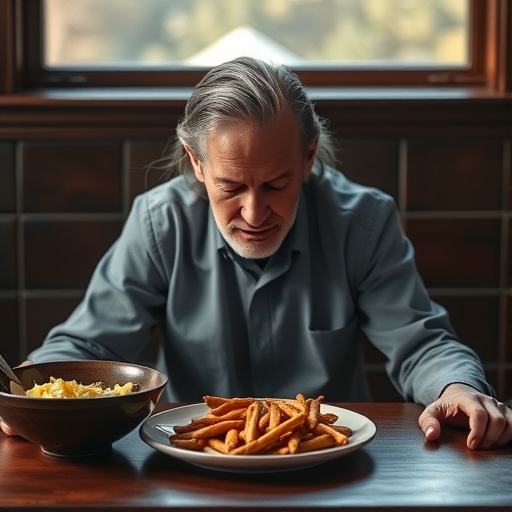In a groundbreaking study that delves into the intersection of spirituality and recovery from overeating, researchers Fannon and Goodman explore how individuals use their spiritual beliefs as a means to combat food addiction. The study, titled “Constructing Spiritual Attachment: A Grounded Theory Analysis of Overeaters’ Use of Spiritual Beliefs for Recovery,” sheds light on the profound impact that spiritual practices can have on mental health and recovery processes. As the realm of addiction recovery continues to expand, this research provides crucial insights into an often-overlooked dimension of recovery that may empower many individuals seeking healthier lifestyles.
The research is built upon the concept of grounded theory, a qualitative methodology that seeks to generate theory through the systematic gathering and analysis of data. This approach allows the researchers to uncover patterns and themes related to spiritual beliefs and their application in the lives of those struggling with overeating. The findings are not only relevant to the field of pastoral psychology but also resonate across various disciplines, including healthcare, psychology, and addiction counseling.
Fannon and Goodman conducted in-depth interviews with a diverse group of participants who identified as overeaters, uncovering how these individuals utilized their spiritual beliefs as a coping mechanism. This study emphasizes the importance of understanding the individual’s personal experience, which can often be overlooked in traditional therapeutic approaches. The participants shared profound anecdotes about how their spirituality provided them with strength, guidance, and a sense of belonging during their recovery journey.
Interestingly, the study identifies key themes that emerged during the interviews, highlighting the multifaceted nature of spiritual beliefs. Many participants described their spiritual practices—including prayer, meditation, and the communal support of religious groups—as vital tools that fostered resilience against cravings and emotional turmoil. This revelation suggests that incorporating spiritual elements into recovery programs could significantly enhance their efficacy.
Additionally, Fannon and Goodman discovered that spirituality provided a framework for meaning-making during the recovery process. Participants articulated how their spiritual beliefs helped them frame their struggles with overeating not only as personal failures but as opportunities for growth and connection to a higher purpose. This shift in perspective is crucial, as it promotes a sense of hope and encourages individuals to pursue a healthier lifestyle without the stigma often associated with addiction.
The researchers also point out the relational aspect of spirituality, emphasizing the importance of community and support networks. Many participants mentioned that sharing their experiences within the context of a spiritual community greatly contributed to their recovery. This finding aligns with existing literature on the importance of social support in the recovery journey, further underscoring that healing is often a collective endeavor rather than an isolated process.
One of the remarkable aspects of this study is how it challenges the conventional perceptions of spirituality as merely a personal or individual endeavor. Instead, it portrays spirituality as a dynamic and relational experience that can enhance psychological well-being. This perspective is particularly valuable in a society that often prioritizes individual achievement and neglects the communal aspects of healing and recovery.
The implications of this research extend beyond personal recovery stories. Fannon and Goodman advocate for the integration of spiritual practices into therapeutic modalities for those dealing with eating disorders. By acknowledging and valuing the role of spirituality, healthcare providers can create more holistic and inclusive treatment plans that resonate with their patients’ identities and belief systems.
The findings of this study open the door for further exploration into how spirituality intersects with other addiction recovery approaches, including cognitive-behavioral therapy and mindfulness practices. There is potential for interdisciplinary collaboration, where spiritual leaders and mental health professionals can work together to support individuals struggling with overeating and other forms of addiction.
Moreover, this study highlights the necessity of training for healthcare providers in spiritual competency. Understanding patients’ spiritual backgrounds and beliefs enables providers to tailor their approaches, fostering a more empathetic and supportive environment. In this way, the integration of spirituality into recovery practices may revolutionize the landscape of addiction treatment, promoting more meaningful and sustained recovery journeys.
As the research community continues to explore the benefits of incorporating spirituality into psychological practices, this study serves as a pivotal resource. It stimulates critical conversations about the need for a paradigm shift in addiction recovery, one that embraces the holistic nature of individuals and acknowledges the myriad of tools at their disposal for healing.
In conclusion, Fannon and Goodman’s research on the spiritual attachment of overeaters is not just a study; it is a call to action for a broader understanding of recovery. By recognizing and supporting the interplay of spirituality and wellness, we can cultivate healthier, more compassionate environments for those navigating the complex landscape of overeating and other addictive behaviors. The revelations presented in this study could very well open new medical avenues that change the course of how we think about recovery and mental health in the future.
Subject of Research: The use of spiritual beliefs by overeaters for recovery.
Article Title: Constructing Spiritual Attachment: A Grounded Theory Analysis of Overeaters’ Use of Spiritual Beliefs for Recovery.
Article References:
Fannon, J., Goodman, G. Constructing Spiritual Attachment: A Grounded Theory Analysis of Overeaters’ Use of Spiritual Beliefs for Recovery.
Pastoral Psychol (2025). https://doi.org/10.1007/s11089-025-01233-3
Image Credits: AI Generated
DOI:
Keywords: Spirituality, recovery, overeating, grounded theory, addiction, mental health.




